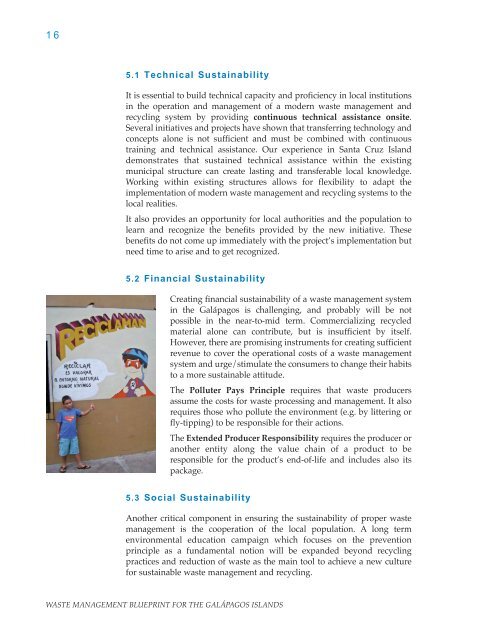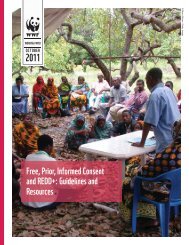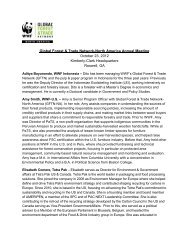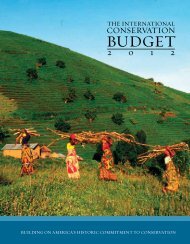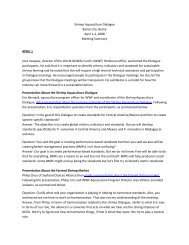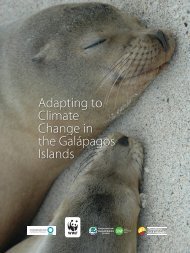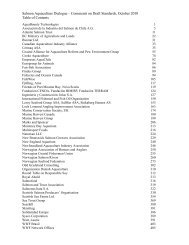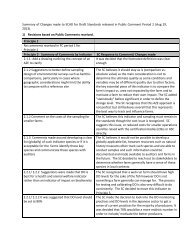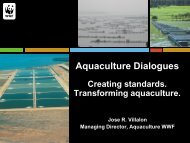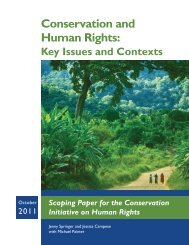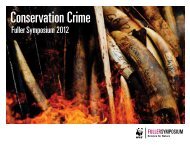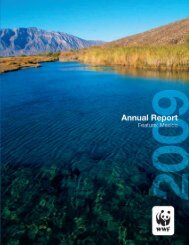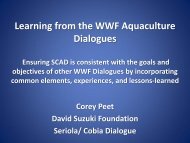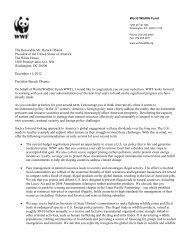Waste Management Blueprint for the Galápagos Islands
Waste Management Blueprint for the Galápagos Islands
Waste Management Blueprint for the Galápagos Islands
- No tags were found...
Create successful ePaper yourself
Turn your PDF publications into a flip-book with our unique Google optimized e-Paper software.
165.1 Technical SustainabilityIt is essential to build technical capacity and proficiency in local institutionsin <strong>the</strong> operation and management of a modern waste management andrecycling system by providing continuous technical assistance onsite.Several initiatives and projects have shown that transferring technology andconcepts alone is not sufficient and must be combined with continuoustraining and technical assistance. Our experience in Santa Cruz Islanddemonstrates that sustained technical assistance within <strong>the</strong> existingmunicipal structure can create lasting and transferable local knowledge.Working within existing structures allows <strong>for</strong> flexibility to adapt <strong>the</strong>implementation of modern waste management and recycling systems to <strong>the</strong>local realities.It also provides an opportunity <strong>for</strong> local authorities and <strong>the</strong> population tolearn and recognize <strong>the</strong> benefits provided by <strong>the</strong> new initiative. Thesebenefits do not come up immediately with <strong>the</strong> project’s implementation butneed time to arise and to get recognized.5.2 Financial SustainabilityCreating financial sustainability of a waste management systemin <strong>the</strong> Galápagos is challenging, and probably will be notpossible in <strong>the</strong> near-to-mid term. Commercializing recycledmaterial alone can contribute, but is insufficient by itself.However, <strong>the</strong>re are promising instruments <strong>for</strong> creating sufficientrevenue to cover <strong>the</strong> operational costs of a waste managementsystem and urge/stimulate <strong>the</strong> consumers to change <strong>the</strong>ir habitsto a more sustainable attitude.The Polluter Pays Principle requires that waste producersassume <strong>the</strong> costs <strong>for</strong> waste processing and management. It alsorequires those who pollute <strong>the</strong> environment (e.g. by littering orfly-tipping) to be responsible <strong>for</strong> <strong>the</strong>ir actions.The Extended Producer Responsibility requires <strong>the</strong> producer orano<strong>the</strong>r entity along <strong>the</strong> value chain of a product to beresponsible <strong>for</strong> <strong>the</strong> product’s end-of-life and includes also itspackage.5.3 Social SustainabilityAno<strong>the</strong>r critical component in ensuring <strong>the</strong> sustainability of proper wastemanagement is <strong>the</strong> cooperation of <strong>the</strong> local population. A long termenvironmental education campaign which focuses on <strong>the</strong> preventionprinciple as a fundamental notion will be expanded beyond recyclingpractices and reduction of waste as <strong>the</strong> main tool to achieve a new culture<strong>for</strong> sustainable waste management and recycling.WASTE MANAGEMENT BLUEPRINT FOR THE GALÁPAGOS ISLANDS


